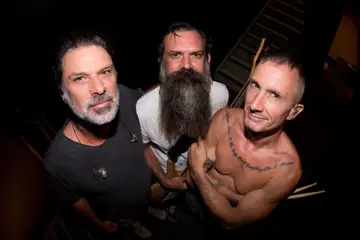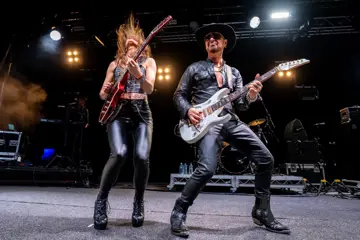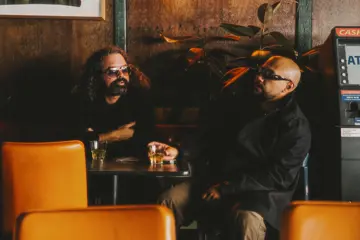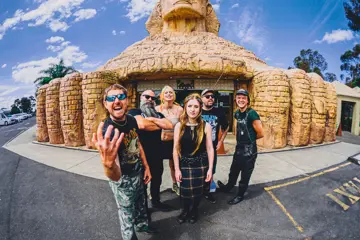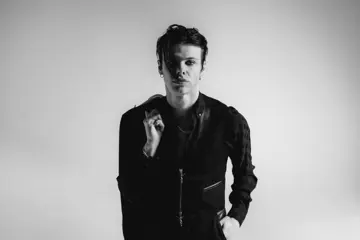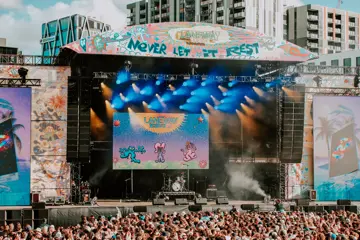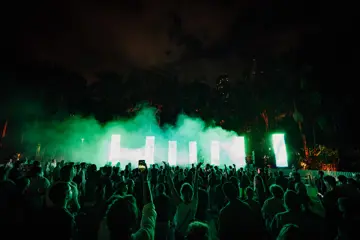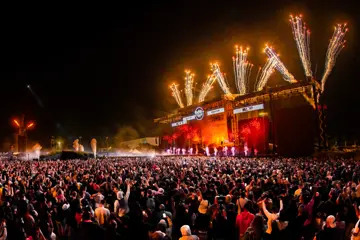 Weyes Blood
Weyes BloodThe last time Weyes Blood set foot in Australia, it was right on the cusp of what may well define the present generation: the complete upheaval of modern society spurred on by COVID-19. The last show of that run went down in Naarm/Melbourne on March 9, 2020 – just two days before the World Health Organisation ruled COVID to be a pandemic – and for many concertgoers, it marked the definitive end of life as we’d known it.
TheMusic caught up with Weyes Blood (real name Natalie Mering) ahead of the tour, and she spoke freely of her ambitions for the album that would follow up on 2019’s Titanic Rising. It would really hone in on that record’s environmentalist themes, but not so much in an aim “to convert people’s hearts anymore”. She explained: “I’ve seen the kind of groundswelling around people that feel something about it. I just know in my heart that the next step is something a little bit closer to the action.”
Mering stayed true to that ethos, though perhaps not as she’d hoped to. Her fifth album – And In The Darkness, Hearts Aglow, which eventually arrived last November – is indeed a direct sequel to Titanic Rising; in an interview with NME, she described it as her “personal response to being in the thick of” what she’d “sound[ed] the alarms” about with its predecessor. It was written and recorded in the midst of the most uncertain times we’d ever experienced, and naturally reflected a lot of deep, dizzying anxiety.
Speaking to TheMusic now, Mering reflects on the beauty she aimed to imbue into Hearts Aglow – because despite how dark its themes can be, she believes that “everything ultimately does have a beautiful side to it”. It all comes down to the notion of “enchantment”, she says, “not so much in terms of straightforward entertainment, like, ‘I’m going to give you what you want and hope you get something out of it,’ but like, ‘I’m going to take something you think you know, and turn it into something completely different.’ Because I think in this very mechanised, sterile world that we live in, we still need to be enchanted. And you can find that enchantment in music.”
Don't miss a beat with our FREE daily newsletter
Never is that truer than at one of Mering’s life-affirming live shows. “I like to be kind of unpredictable,” she says of the atmosphere she conjures up in concert. “I like to take the audience on a journey with me, and hit all these different peaks and valleys – I want to lift you up and then bring you back down, then lift you up again.”
Those who have seen Mering perform will understand it’s an experience entirely unique to her shows – a unique feeling she’s spent some two decades honing her skills in eliciting, which “doesn't necessarily exist in real life, but certainly exists on this night, in this room, for this group of people”.
The sentiment calls back to an interview Mering gave The Guardian last year, where she reflected on her upbringing in the Church and explored how even now, that continues to inform her artistry. “If you look at the history of music,” she said, “most of it was made for God – secular music used to be the exception. I would hope to keep the channel alive, not in a dogmatic Christian sense, but in the sense of music being this transcendent vehicle to take you to a more sacred space.”
By proxy of this ethos, Mering’s live show can, in a sense, be considered her Mass. The mentality involved is certainly very similar, she agrees, noting that “both [Mass and live music] follows this idea that we are congregating in a space to transcend whatever it is we experience outside of it”. And although her own shows are not particularly chaotic – Mering does, after all, deal in meditative chamber pop, not the typical fare primed for mosh pits – the experience is still “extremely cathartic” in a similar way to how devout Christians tend to see Mass.
“I don't think there are many spaces where people can congregate and really ‘let go’ quite like they do at a concert,” she expounds. “When you’re not religious, the concert venue is the closest thing you have to a church. If the church is done and God is dead, that energy has to be redistributed – and I think it’s wound up in entertainment, for better or for worse. The concert has a certain kind of authenticity to it: it’s like, ‘Well, we're going to do this one time, here, live, and you kind of have to be here to tell if any of it’s real.’”
Like actual Masses, Mering’s live show takes many forms: she’s played everywhere from neon-tinged dive bars to the world’s stateliest pavilions, to destination festivals like Coachella and all manner of venues in-between. But regardless of where she performs, Mering’s psyche remains the same: “I’ve had some really amazing feelings in theatres,” she explains, “and I’ve had some really amazing feelings in clubs. I don’t think it matters where the show is being held – the most important thing is the connection that exists between the audience and the people onstage; that’s what generates the transcendent nature of music.
“When you play somewhere like the Hollywood Bowl or the Greek Theatre, you do feel the magnitude of people and the breadth of that space, and that is, in itself, something very psychedelic and emotionally resounding, for sure. But as far as trying to establish that chemistry between yourself and an audience, I think that can happen naturally in any venue.”
In just a few weeks, Mering will add another one of those grandiose halls of note to her checklist: the Sydney Opera House, where she’ll perform on Thursday June 1 and Sunday 4, as part of this year’s Vivid LIVE program. “I’m definitely very excited to be in that room,” she says. “I’ve always noticed, when I’d see it on postcards and in movies, just how incredible that building is.”
Mering is stoked to be on the VIVID lineup, too, noting that she’s keen to see a few shows as a punter herself. “I just love seeing live music,” she gushes. “The last time I played in Australia, I played with Moses Sumney, and it was really fun to see him perform every night as well. I’m not sure what shows I’ll be able to head along to – logistically, sometimes I have to get into that zone where I’m really just focused on my own shows, in which case I don’t spread myself very thin. But I’m very excited to see what I can check out.”
That effort to steer clear of burnout is one Mering adopted during the peak of the pandemic, when she made a push to reckon with her long-undiagnosed ADHD. “The signs in young women are harder to identify,” she notes, “so I was never diagnosed in elementary school. But women experience this kind of burnout in their 30s, when you’re trying to balance keeping up with appearances and keeping everything [in your personal life] intact, where everything just kind of crashes down on you. And I feel like the pandemic really showed me just how hard I was crashing. When I was on tour, I had so much going on that I didn't really have to think about how exhausted I was – so when the pandemic happened, it became really clear that I’d been struggling for so long.”
As she gears up to start recording her sixth studio album – the climactic finale of the story that started with Titanic Rising and evolved with Hearts Aglow – Mering says she’s more conscious than ever about how she treats herself. “I’m understanding my limits and my boundaries much more,” she says, “and just kind of being a bit more tender with myself. Because I'm a big overachiever – I would always just do whatever I could to meet people’s expectations – but now I feel a little more confident to be like, ‘No, I don't really need to make anyone happy – it's just gonna be what it is.’ And that is so fulfilling, creatively.”
You can find tickets to Weyes Blood's Vivid LIVE Show here.


